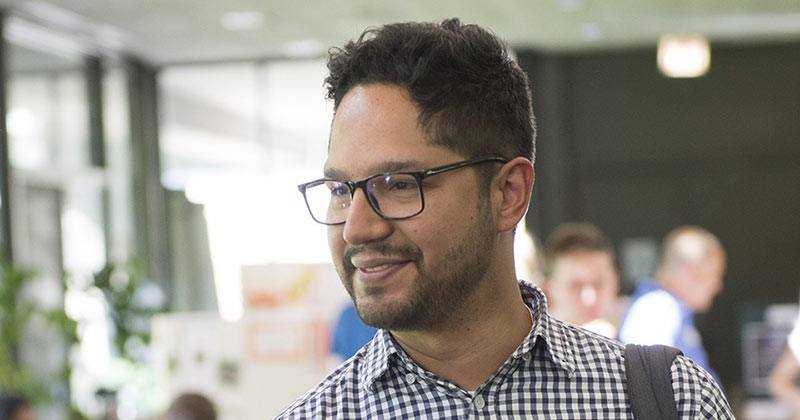Ismael Calderón’s journey led to Jesus

Ismael Calderón took an unusual path to seminary to be sure. But in just a few years, he has made a home in both the United States and the Lutheran church.
“You are so Lutheran and you don’t even know it,” one pastor told him as he articulated his faith.
Calderón was born and spent his early years in Caracas, Venezuela, where his Colombian family had moved during the 1980s oil and economic boom. The family moved back to Colombia in 1998, prior to the emergence of the social, economic and political crisis currently affecting Venezuela. When he was 5, his mother immigrated to the United States to find work, sending money back to Colombia so her children, who were living with their grandmother, would be more financially stable and have a better chance at an education.
As a result, he went more than 15 years without seeing his mother, but she had found employment in the northern Illinois area, which has now also become his home.
In Colombia, he attended a military (conservative Roman Catholic) school. His grandmother took him to church weekly, and had a strong influence on his faith, which in young adulthood he would describe as “spiritual, not religious.” During those years, he found refuge in the letters, poetry and readings of German philosophers Emmanuel Kant and Friedrich Nietzsche as he tried to understand his own reality as a gay man, and the loneliness and depression that accompanied him. His interest in philosophy allowed him to challenge conservative teachings. He holds a bachelor’s degree in International Relations from Jorge Tadeo Lozano University in Bogota, Colombia.
In 2015, Calderón came to the U.S. to take care of his mother. He was focused on her health but began working and networking as an AmeriCorps VISTA worker for United Way of Lake County. He was instrumental in developing a new program called “Better Together,” which helps children and families living in poverty, many of them immigrants, to handle day-to-day challenges. Not unlike his own mother, these parents and caretakers, “despite any challenges they may have personally, always put their children and their education first,” he said.
“It was so challenging, but a blessed experience,” he said. “It opened doors for me.” One of those doors was the position of immigration case manager, then outreach and citizenship education coordinator at Hispanic American Community and Education Services, a non-profit that supports and educates immigrants through the path to citizenship (i.e. waivers, visas, passports, legal services, Dreamers and DACA). The work was both a privilege and depressing.
In 2016 he left his job to return to Cartagena, Colombia, this time to care for his grandmother. While there he had time to wrestle with his faith and future. Through his immigration work in Waukegan, he had been introduced to the local congregation of Parroquia Luterana Sagrado Corazon and Pastor Nestor Espinoza Perez, who was able to answer Calderón’s nagging question about the church’s position on gay people.
“ ‘We are open and inclusive,’ ” he told me. “I said, ‘I want to become Lutheran now.’ ”
And, indeed, he did. In short order, he became involved in the congregation, and now serves on its church council. He was tapped to work on an ELCA stewardship event in Dallas, and be a churchwide representative to an HIV/AIDS conference in Amsterdam. He applied to LSTC and was accepted, and his contacts and connections enabled him to afford this next chapter in his life. His work site as a Public Church Fellow was developed with the ELCA’s HIV/AIDS Initiative.
Despite the language barrier and rigorous learning, “I feel like I belong here,” he said, looking around the Refectory. “I feel so privileged and so blessed… My religious faith is in the middle of everything. Right now my faith is Jesus. God was trying to push me to focus on Jesus… Now I’m not scared to be myself. Now I’m not scared to say I’m Lutheran. Now I’m not scared to say what I feel. And now I feel so grateful to say I love you to the people. To be there for people…
“That’s my journey. It led to Jesus. This is me. I am one of this group, just another servant. I want to be part of that Jesus work.”